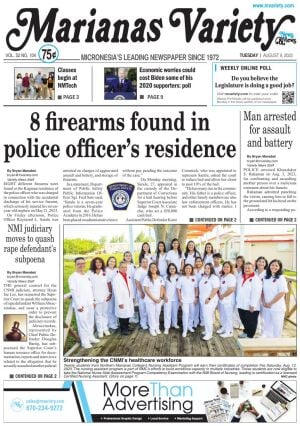1997 was a banner year for the CNMI economy. Tourist arrivals totaled 726,690 — the highest in Commonwealth history — and the government’s proposed budget amounted to an amazing $257 million, which is equivalent to $480.9 million today. (The projected revenue for FY 2024? $172.5 million.) Back then, the central government was remitting its contributions to the NMI Retirement Fund regularly, and could afford a local earned income tax credit program. The medical referral program and other government agencies and offices were adequately funded, and the government and the private sector were on a hiring spree. For its Friday, July 11, 1997 issue, MV had 52 pages. Which was quite “thin” compared to our Friday, Oct. 31, 1997, pre-election issue, which had 128 pages. Still a CNMI record.
At the time, no one — absolutely no one — had an inkling that a severe and long-lasting economic downturn was a few months away.
Twenty-six years ago, Liberation Day was a magnificent event with so many participating floats, marching groups, performers, unique vehicles and thousands of on-lookers. The islands’ beauty queens, including Little Miss CNMI, joined the reigning Liberation Queen on the last parade float. The celebrations continued at American Memorial Park “with food and games booths as well as live entertainment and a grand fireworks showcase later in the evening.”
In his Liberation Day speech, however, the then-governor, Lang Tenorio, complained about the federal government’s meddling in local affairs. He said the U.S. “pretends to care about human rights [but] is too cheap to budget funds to enforce violations of federal laws” involving guest workers. The governor said if the U.S. president really cared about the CNMI’s labor problems, “he would appoint a full-time U.S. attorney to prosecute federal crimes in the Commonwealth as called for in the Covenant.” Gov. Lang said he had requested a full-time U.S. attorney since he took office in 1994.
As for the proposal to federalize local immigration and minimum wage, he said it would “ruin our economy and return us to the slavery of dependence on federal handouts. And maybe this is their real agenda….”
In other news: the Department of Public Works announced that it would widen Monsignor Guerrero Road into a four-lane road from the Microl (now AK) intersection to Northern Marianas College. In Garapan, the construction of the CNMI Museum had been completed while the U.S. Postal Service said it would expand and modernize the post office in Chalan Kanoa. Gov. Lang also proposed a $21 million (worth $39 million today) new correctional facility in Kagman. Ninety percent of the cost would be financed by a South Korean company and re-paid by the CNMI government at an annual interest rate of 7.5%. It was a sole-source contract that required legislative approval, and lawmakers said no. However, many of them said yes to a bill that would ban nude dancing in local night clubs. But according to Gov. Lang, the bill was “unconstitutional.” He said “those who don’t want to watch nude dancing are not forced to do so anyway.”
At the Department of Public Safety, a police officer, a firefighter and a civilian employee tested positive for illegal drug use. Two were found positive for marijuana use while one indicated meth use. Under the department’s drug policy, all DPS personnel had to undergo “voluntary” drug and alcohol testing. (Fire and Corrections were still DPS divisions.) Employees who tested positive were immediately removed from “safety-sensitive” positions. Those who hold such positions were subjected to a random monthly urine analysis.
Also in the news: the trial of a CNMI immigration captain accused of raping a detained foreign worker awaiting deportation. He was found guilty and was sentenced to a six-year prison term. His victim also sued him in federal court. The defendant settled the civil lawsuit by promising to pay her $50,000 (worth about $94,000 today) in installments.
In March 1997, in an interview with Howard P. Willens and Deanne C. Siemer, Gov. Lang, a civil engineer who founded his own construction company, said when he “became involved in politics, I got into trouble with the company, because people then were charging and not paying, and I couldn’t go up to them because I was a politician.”
As governor, Lang said, “I had to stop the medical referral program [in 1995] because we didn’t have the money. Now we have it. This is the thing. I just have to tell the people, look, if you want me to provide you the services that you expect from the government, then you’d better favor economic development.”
Send feedback to editor@mvariety.com

















